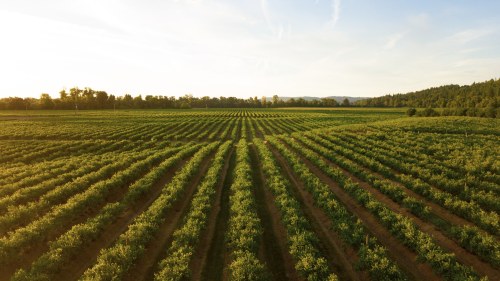Embracing Interconnectedness: How Indigenous Foodways Can Save Us

Indigenous perspectives utilize regenerative farming practices through embodying interconnectedness, ultimately protecting the environment from climate change.
In October of 2022, the Chicago Council on Global Affairs is launching a blog series titled, “Stewardship, Sovereignty, and Solutions” that features the voices of guest authors from Indigenous organizations and communities. Recognizing that Indigenous communities around the world disproportionately experience the pressures of climate change, global conflicts, and the pandemic, while simultaneously stewarding 80 percent of the world’s biodiversity, the blog series aims to highlight Indigenous and traditional agricultural practices in the US and globally. In bringing attention to Indigenous agriculture and foodways, we aim to promote a truly inclusive global food system that recognizes and actively counteracts the oppression of Indigenous peoples.
"There comes a time when humanity is called to shift to a new level of consciousness... that time is now."
Soul Fire Farm’s perspective on food sovereignty emphasizes that all life is interconnected, elevating an Indigenous worldview that can help alleviate the effects of climate change. Coupled with Afro-Indigenous orientations to land and farming practices, Indigenous perspectives can help us navigate and address myriad crises, and ultimately embody interconnectedness.
Indigenous Solutions to Climate Change Reify That All Life Is Interconnected
The Intergovernmental Panel on Climate Change (IPCC) predicts that multiple climate tipping points will occur a decade sooner than previously anticipated due to anthropogenic climate-change created conditions. The impact of climate change on agriculture in the United States has already been seen in costs to infrastructure and property; crop losses; labor availability, health, and productivity; water and heat related stresses; and ecological diversity. We are in an all-hands-on deck moment that requires all nations, industries, and peoples of the world to shift how we live, work, and relate to one another and the environments we are a part of if we want our descendants to survive and thrive in the future.
There is much to unfurl in identifying solutions to the climate crisis as a whole, as well as within the agricultural sector, as we inherit a family, community, and society that is predicated on individualism and hierarchies. More than investments in technologies and strengthening political will of elected leaders and the public to advocate for change, we need a massive shift in how we as humans orient ourselves to the natural world and to one another. We are in a moment when the humility of listening deeply to and learning from Indigenous worldviews and practices could very well save us.
In this current moment, each nation, sector, and group of people who have been separated from their Indigenous roots by any number of historic forces (wars, colonization, enslavement, formation of class-based societies, migrations, etc.) can benefit tremendously by remembering, embodying, and living according to one of the most fundamental beliefs held by many Indigenous people across time and space: all life is interconnected.
Seeing ourselves a part of and not separate from the natural world requires an orientation that is different from hierarchical notions embedded within modern cultures, ideologies, and practices. The decisions and actions that flow from these Indigenous orientations are fundamentally different from those held by the descendants and defenders of colonial capitalism, the prevailing socio-economic and political theme of this era.
Viewing a tree, body of water, or land as a separate thing that can be commodified and exploited is essential to the colonial project of sowing disharmony in our relationship with the natural world. Such an orientation makes it easier to steal land, disrupt families, pollute air and water, destroy ecosystems, exterminate entire species, and subjugate populations. Solutions to the climate crisis consistent with this orientation lead to profit-driven technological fixes that create pockets of security for those with the economic means to afford it. These solutions include nutrient-deficient foods dependent on fertilizers and pesticides to grow. The decisions and practices that emerge from an Indigenous worldview look quite different from this.
Afro-Indigenous Orientations to the Land and Farming Practices Protect the Environment from Climate Change
An Afro-Indigenous understanding that all life is interconnected requires that we are clear that the health and wellness of each member of an ecosystem (including the soil, trees, plants, animals, water, and human stewards) is dependent on all others in that community. This means forging relationships with one another, getting to know the seasons, observing each ecosystem member through its lifecycle, and showing up in the ecosystem community responsibly. It means that we as humans see ourselves as a species that lives in community with them, such that we return in equal measure what we take from the environment and refrain from taking more than is necessary for the system to naturally recover from the loss.
We can look to our Indigenous forebears and elders for guidance on how to navigate through and address myriad crises. If we were to focus on the impact of climate change on agriculture and the role agriculture can play in addressing the climate crisis, we would remember the gift of what they gave us around interconnectedness to inform how, what, and where we grow. The modern concepts for Indigenous practices that reflect worldviews of connection and relationship used at Soul Fire Farm include, for example, agroforestry and silvopasture, intercropping and polycultures, water management, permaculture, and wildcrafting. The practices also include making offerings to the land, and consulting the land when making decisions about where to farm, where and how to erect structures, and where to make land modifications. Taken together, this Afro-Indigenous orientation to the land and the farming practices that flow from it create nutrient-rich soil, sequester carbon, provide greater protection during moments of heat and water stress, and create thriving communities full of life.
Embodying Interconnectedness Moves Us beyond Ideas and Practices with Harmful Consequences
Embodying interconnectedness means shifting beliefs away from resource-intensive industrial monocropping. We have learned that it deprives the lands of vital nutrients, requires chemicals to grow, and in turn produces nutrient-deficient plants that contain pesticides and herbicides. Further, it contributes to die-offs of critical beings needed for healthy, diverse ecosystems. There are substantial, lasting, and devastating consequences from use of industrial fertilizers and pesticides on the health of animals, farmworkers, water systems, ecosystems, and consumers.
Embodying interconnectedness and living in a healthy, responsible, and regenerative relationship with the earth, with nature, with one another, with other life forms are only a few of many offerings from our Indigenous ancestors and elders. These simple teachings provide a way of living that moves us beyond the ideas and practices that have harmful consequences for the land and land beings beyond human form, such that we can avoid natural resource depletion, ensure healthy biospheres, and enable future generations of all life forms to thrive.
Soul Fire Farm is a BIPOC-centered community farm committed to ending racism and injustice in the food system. We raise and distribute life-giving food as a means to end food apartheid. With deep reverence for the land and wisdom of our ancestors, we work to reclaim our collective right to belong to the earth and to have agency in the food system. We bring diverse communities together on this healing land to share skills on sustainable agriculture, natural building, spiritual activism, health, and environmental justice. We are training the next generation of activist-farmers and strengthening the movements for food sovereignty and community self-determination.
This blog was authored with assistance from Susuyu Lassa, Co-Coordinator of Alumni and Partnerships at Soul Fire Farm, and Natalie Burdsall, Communications Officer at the Chicago Council on Global Affairs’ Center on Global Food and Agriculture.


Related Content
- Embracing Dandelions as Food and Medicine
- Going Beyond Regenerative Agriculture on Tribal Lands
- Expanding "638" to Enhance Native American Food Sovereignty
- Flavors and Culture: Food Systems Through Indigenous Women's Eyes
- A Thanksgiving Legacy: Fighting for Indigenous Food Sovereignty
- Native Food Sovereignty: Strengthening Connection to Culture
- Reconnecting to Indigenous Food Sovereignty Values and Practices
- Embracing Interconnectedness: How Indigenous Foodways Can Save Us